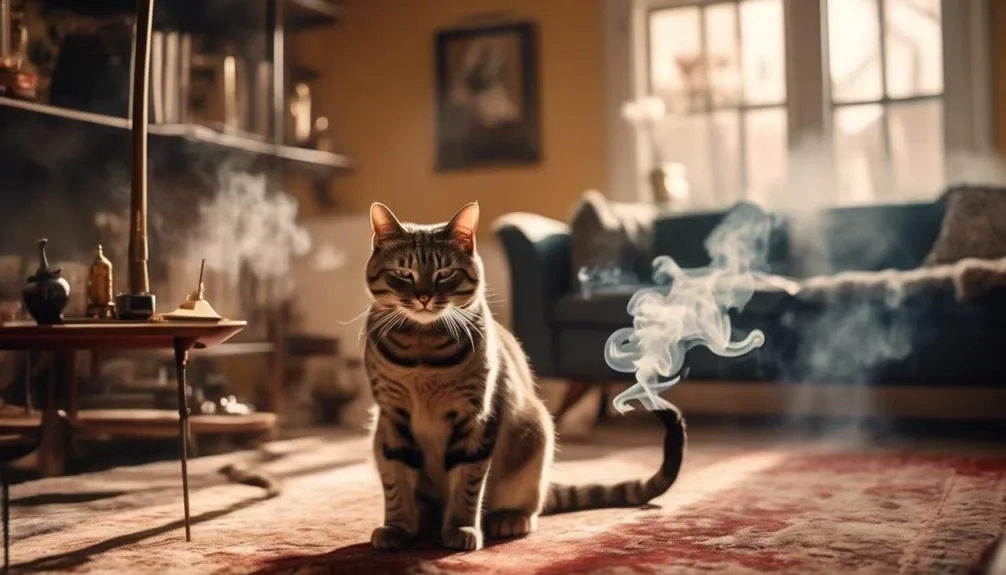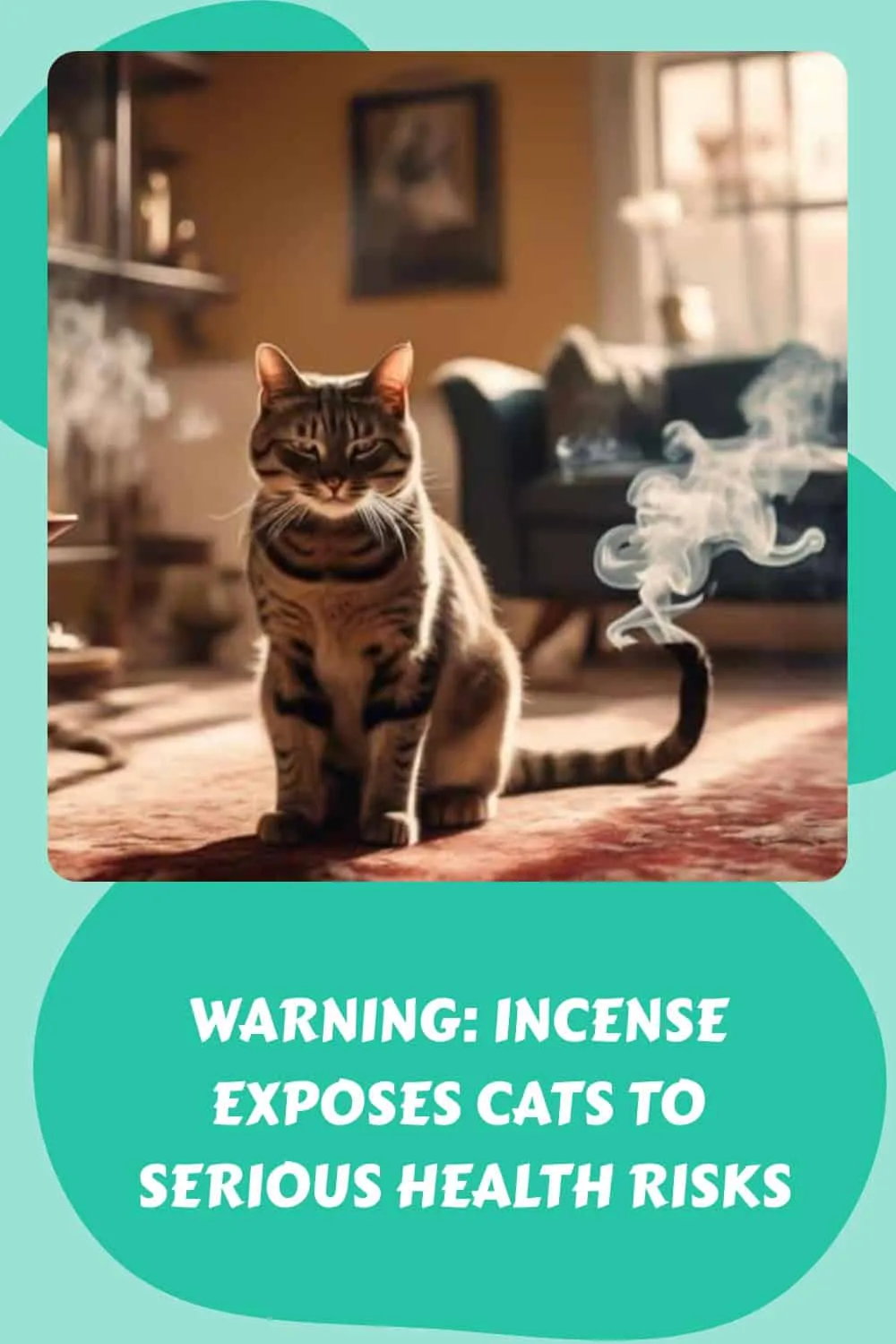The Best Fluffy Pancakes recipe you will fall in love with. Full of tips and tricks to help you make the best pancakes.

The scent of incense has long been cherished for its ability to create a calming and serene atmosphere.
However, what many cat owners may not be aware of is the potential harm that incense can pose to their feline companions. Cats, with their heightened sense of smell, are particularly susceptible to the adverse effects of incense smoke.
In this article, we will explore the serious health risks that incense can expose cats to, shedding light on the dangers that may go unnoticed. Understanding these risks is paramount to ensuring the well-being of our beloved pets, and discovering safer alternatives is just as crucial.
So, let us embark on this journey of knowledge and uncover the hidden dangers of incense for our furry friends.
Key Takeaways
- Incense smoke is harmful to cats and can lead to serious health consequences.
- Cats have a stronger sense of smell than humans, making the scent of incense overwhelming for them.
- Excessive exposure to incense smoke can be toxic to cats and lead to poisoning.
- It is recommended to avoid using scented candles, essential oils, and air fresheners in homes with cats.
Dangers of Incense Smoke
Incense smoke poses significant dangers to cats, with its harmful effects on their respiratory system and overall health.
Cats are more sensitive to odors than humans, making the strong scent of incense overwhelming for them.
Inhalation of incense smoke can lead to respiratory issues and worsen existing conditions such as asthma in cats.
Moreover, excessive exposure to incense smoke can be toxic to cats and may result in poisoning.
This highlights the importance of considering indoor air quality when using incense.
The volatile compounds present in incense smoke can compromise the respiratory health of cats and have an adverse impact on their well-being.
To protect feline health, it is advisable to limit or avoid the use of incense in homes with cats and ensure proper ventilation to reduce the concentration of harmful smoke.
Cats' Sensitivity to Incense
Cats' sensitivity to the effects of incense smoke is a critical consideration when evaluating the potential risks to their respiratory health and overall well-being. Understanding how cats behave around incense and finding ways to minimize their exposure is essential for their safety.
Here are some key points to consider:
- Cats' behavior around incense:
- Cats may be attracted to the scent of incense due to their keen sense of smell.
- Some cats may try to play with or chew on burning incense, putting them at risk of burns or ingestion.
- Ways to minimize cats' exposure to incense:
- Keep burning incense in a room where cats are not present to prevent inhalation of smoke.
- Store incense securely in a location that is inaccessible to cats.
- Open windows for proper ventilation when burning incense to reduce the concentration of smoke.
Respiratory Issues and Asthma
Respiratory issues and asthma are common health concerns that can be exacerbated in cats exposed to harmful substances like incense smoke. Cats have delicate respiratory systems, and their lungs can be particularly sensitive to irritants in the air.
Incense smoke contains various chemicals and particulate matter that can irritate the airways and trigger respiratory symptoms in cats, especially those with pre-existing respiratory conditions like asthma. Asthma in cats is a chronic inflammatory disease that affects the airways, leading to coughing, wheezing, and difficulty breathing.
Exposing cats to incense smoke can worsen these symptoms and increase the risk of asthma attacks. Therefore, it is crucial to take measures to prevent asthma attacks and manage respiratory issues in cats by avoiding the use of incense and providing a clean and smoke-free environment.
Incense Smoke Toxicity and Poisoning
Exposure to the smoke emitted by burning incense can pose significant health risks to feline companions. While the focus of this article is on the effects of incense smoke on cats, it is worth mentioning that long-term exposure to incense smoke can also have adverse effects on humans. Here are some important points to consider:
Effects of incense smoke on humans:
- Incense smoke contains harmful compounds such as volatile organic compounds (VOCs), particulate matter, and carbon monoxide, which can irritate the respiratory system and contribute to respiratory problems.
- Prolonged exposure to incense smoke has been associated with an increased risk of respiratory diseases, including asthma, bronchitis, and even lung cancer.
- The combustion process of incense can release toxic chemicals, including formaldehyde and benzene, which are known carcinogens.
Long-term exposure to incense smoke:
- Regular and prolonged exposure to incense smoke can lead to chronic respiratory issues and worsen existing respiratory conditions, especially in individuals with pre-existing lung diseases.
- The accumulation of toxic compounds from incense smoke in the body over time can have damaging effects on various organs and systems, including the respiratory, cardiovascular, and immune systems.
It is essential to be aware of the potential health risks associated with incense smoke, both for cats and humans. Taking necessary precautions, such as avoiding or minimizing exposure to incense smoke, can help protect the health and well-being of everyone involved.
Harmful Effects of Scented Candles
The use of scented candles can pose potential health risks for both cats and humans. When burned, scented candles release volatile organic compounds (VOCs) into the air, which can decrease indoor air quality and potentially harm respiratory health. These VOCs can irritate the respiratory system, leading to symptoms such as coughing, wheezing, and difficulty breathing. Cats, with their smaller size and more sensitive respiratory systems, may be particularly vulnerable to these effects.
To minimize the risks associated with scented candles, it is important to choose pet-friendly candles. Look for candles made from natural, non-toxic ingredients, such as soy or beeswax, as they produce less soot and fewer VOCs when burned. Avoid candles with added fragrances or essential oils, as these can be toxic to cats. Additionally, ensure proper ventilation when burning candles and never leave them unattended.
Essential Oil Poisoning in Cats
The use of scented candles can pose potential health risks for both cats and humans. Another concern for the wellbeing of cats arises when essential oils are involved. Essential oil poisoning in cats can occur even with minimal contact. It is important for cat owners to be aware of the signs and symptoms to ensure prompt treatment.
Here are the signs and symptoms of essential oil poisoning in cats:
- Drooling
- Vomiting
- Decreased heart rate
- Difficulty breathing
If a cat shows any of these signs after exposure to essential oils, immediate veterinary attention is necessary. Treatment options for essential oil poisoning in cats may include decontamination, supportive care, and specific antidotes depending on the type of essential oil and severity of the poisoning.
It is crucial for cat owners to take precautions and avoid using essential oils in homes with cats to prevent these serious health risks.
Air Fresheners and Respiratory Problems
Air fresheners have been linked to respiratory problems in cats, highlighting the potential risks of these products for feline health.
While air fresheners are commonly used to improve indoor air quality and eliminate odors, their effectiveness in achieving these goals may come at a cost to cats' respiratory health.
Volatile compounds present in air fresheners, such as chemicals and fragrances, can release harmful particles into the air that cats can inhale. These particles can irritate their respiratory system, leading to symptoms such as coughing, wheezing, and difficulty breathing.
Furthermore, long-term exposure to these volatile compounds may exacerbate existing respiratory conditions in cats or even contribute to the development of new ones.
Therefore, it is crucial for cat owners to be mindful of the potential impact of air fresheners on their pets' respiratory health and consider safer alternatives that do not pose a risk to their well-being.
Safer Alternatives to Incense
Consider using alternative methods that are safer for cats instead of burning incense. One such alternative is using air purifiers, which offer several benefits over incense. Here are some key points to consider:
- Benefits of using air purifiers instead of incense:
- Air purifiers improve air quality by removing harmful particles, allergens, and odors from the environment.
- They do not produce smoke or release potentially toxic substances, making them safer for both cats and humans.
- Considering cats' reactions to air purifiers:
- Some cats may be distressed by the sound of air purifiers. It is important to introduce them gradually and monitor their reactions.
- Placing the air purifiers in a location where cats cannot access them or get tangled in cords is crucial for their safety.
Conclusion
In conclusion, it is essential to recognize the potential dangers of incense and similar substances for cats. The strong scent of incense can be overwhelming for cats and can lead to respiratory issues and even poisoning.
Scented candles, essential oils, and air fresheners can also be harmful, especially for cats with existing respiratory problems.
To ensure the well-being of our feline companions, it is important to monitor their exposure to these substances and consider safer alternatives. For instance, using unscented candles or diffusing pet-safe essential oils can be a healthier choice.










